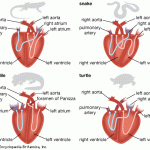Social Sciences
I have had a lot of fun at this year's Experimental Biology conference. I always enjoy attending the symposia to listen to current research news as well as interact with fellow comparative physiologists at all levels of training. Here are the highlights from the sessions on Tuesday and Wednesday:
Tuesday:
J. Hicks, August Krogh Lecture: "Tales from the heart: A comparative and evolutionary perspective of the vertebrate circulatory system"
Dr. Hicks gave a wonderful talk on the evolution of the heart and the physiological purpose of shunting that occurs in the crocodilian heart, which is four…
A couple weeks ago, the second creationist bill of the "academic freedom" generation became law. You'd think Casey Luskin, who seems to be the ringleader of the clowns pushing these bills, would be thrilled. But all he can seem to do is find reasons to be upset.
First he was angry that Tennessee Governor Bill Haslam let the bill become law, but did so without signing it. Haslam's statement refusing to sign the bill observed that, by the defenders' own argument, the bill was essentially powerless, while there are ways in which it could make things worse. Noting that laws ought to "bring…
The schedule called for this to appear last Friday, but as I was just back from a funeral, yeah, not so much. I had already gone through and bookmarked a whole slew of old posts, though, so here's a recap of the 2003-2004 blogademic year (starting and ending in late June).
This year saw a few milestones, though not quite as many as the previous year. I got a grant, passed my third-year reappointment review (the first big hurdle on the way to tenure), and we had a visiting speaker from Yale one week who mentioned in passing an idea that became central to my research program.
Probably the most…
Livescience.com asked me a bunch of question about the Ales stenar stone ship on the occasion of Mörner & Lind's new bizarro paper. They didn't use much of what I wrote, so I'll put it up here.
LS: What is the most remarkable thing -- physical, historical or otherwise - about Ales Stenar?
MR: Its excellent state of preservation and restoration. These large stone ships form a common category of monuments, but few are currently as nice-looking as this one. (Ales stenar is not one of the largest ones we're aware of.) Also it sits in a scenic spot in one of Sweden's main tourist regions.
LS…
What's up in the solar system in April 2012 - The Planetary Society Blog | The Planetary Society
Lest you get too depressed about the mothballing of the Space Shuttles, a roundup of all the cool space probes out there producing real science.
Yes, I Took My Ninth Grader on a College Tour (and It Was Worth It) - NYTimes.com
The purpose of bringing busloads of middle-school children to campuses is not to emphasize a particular place. Mr. O'Hara says he downplays the names of particular campuses. They visit student centers, libraries and dorms, take in a varsity basketball game, and meet with…
Don't forget to show your pride in comparative physiology at this year's EB. If you get caught wearing something that says "comparative physiology", "Dr. Dolittle", or "Life Lines," by one of the APS staffers or members of The American Physiological Society's Communications Committee, you just may win free coffee!
I don't know about you, but I am getting very excited about the upcoming Experimental Biology conference in San Diego! Our posters have been printed and I am just taking a break from pouring over the program to decide which sessions and posters I will be visiting. These…
In the NYTimes today, Nicholas Kristoff asks just the wrong question "Is an egg for breakfast worth this?" Of course, it isn't, but that's not the right way to frame this. Nothing about an egg for breakfast could be worth this in terms of animal cruelty, human health or any number of other considerations:
"It's physically hard to breathe because of the ammonia" rising from manure pits below older barns, said the investigator, who would not allow his name to be used because that would prevent him from taking another undercover job in agriculture. He said that when workers needed to enter…
Sometimes, following the path scientific results take as they enter more mass media awareness really is like a game of telephone — you can scarcely recognize the original work in the final summary that ends up in the news media. And sometimes, you find that the scientists contributed to the ghastly mess.
Take a look at this silly story, "Could 'Advanced' Dinosaurs Rule Other Planets?", illustrated with a picture of a T. rex stalking the landscape.
New scientific research raises the possibility that advanced versions of T. rex and other dinosaurs -- monstrous creatures with the intelligence…
The USA Science and Engineering Festival will really heat up when Popular Science and Make Magazine writer William Gurstelle speaks at the Family/Hands-on Science Stage on Sunday morning. Gurstelle, who wrote the bestselling DIY science book Backyard Ballistics, will be reading from his newest book, The Practical Pyromaniac. The book is a hands-on guidebook to playing with fire and narrates the story of humankind's long-coming understanding of the most important chemical reaction on the planet.
In addition to his talk, William will join a number of other well-known science authors including…
By Larry Bock
Founder and organizer, USA Science & Engineering Festival
In our world of high-tech bravado, I often wonder where we'd be without explorers -- those undaunted heroes and heroines of the past and of today whose achievements, like an unforgettable song or movie -- form a lasting impression in the brain over what the human spirit can accomplish with will and perseverance.
From the annals of history, their names roll off the tongue almost effortlessly: Vespucci, Columbus, Lindbergh, Earhart, Shackleton, Henson, Cousteau, Glenn and others -- people who, bolstered by a sense of…
Maybe my email worked? I got a one sentence reply from Max last night saying he agreed, and today Tucker Max says hellz no to PETA and instead wants to give to a local shelter:
I do not agree AT ALL with the mission of PETA.
...
If we're talking about what an awful organization PETA is, that's really just the beginning. They're so ridiculous, they compared the holocaust to killing chickens. Not only that, but they have a history of shitting on celebrities they've worked with in the past. And perhaps worst of all, they are the ones that think violence against women is OK. Their stated…
You may have heard about Planned Parenthood turning down Tucker Max's 500k charitable donation on the grounds his misogynistic past marred the gift.
Now PETA is asking for the donation.
Let's beg him not to do this. Instead of giving money to the dog-killing animal rightsists, how about a donation to pro-test and put a thumb in the eye of the anti-research pet killers? Send him a message, donate the money to a pro-science group.
Here's my email to Tucker:
Hey, I hear you're looking to give a charitable donation and now PETA is saying they'd be happy to receive it. As a pet owner, doctor…
Over in Scientopia, SciCurious has a nice post about suffering from Impostor Syndrome, the feeling that everyone else is smarter than you are, and you will soon be exposed as a total fraud. Which is nonsense, of course, but something that almost every scientist suffers at some point. The post ends on a more upbeat note, though, when she thinks about fighting it:
The more I thought about ways to combat imposter syndrome, either by myself or in academia in general...the more I came up with nothing. Until today, when I was working out.
I'm doing circuit training, and as I worked my way through…
NCSE policy director Steve Newton explores the evolution of American creationism and how anti-evolution activities have changed from the Scopes era to the present. Newton explains creationism's many faces, from dinosaurs-lived-with-humans young earthers to "intelligent design" advocates to legislators promoting "academic freedom" legislation. Newton's talk will examine why teaching evolution--and science in general--is so important, and suggest ways for the pro-science community to counter creationist assaults on science education. Where: Oakmont Sunday Symposium, Santa Rosa, CA. When: 2/15/…
by Kim Krisberg
A couple weeks ago on the southern-most tip of the continental United States in Key West, nearly 70 residents gathered at a town hall meeting to talk about mosquitoes. And not just any mosquito. A special, genetically modified mosquito designed to protect people's health.
While the modified mosquito has yet to make the two-mile wide island its home, local mosquito control officials are busy making the case that its intentional release will help safely contain the risk of mosquito-borne dengue fever, which made a startling reappearance in Key West in 2009. The male mosquito is…
In discussing the relevance of archeology to anything, there is an easy answer provided by my friend Peter Wells, a specialist in Culture Contact and the Central European Iron Age. Peter tells his students on the first day of class that "Archaeology is the study of everything that happened anywhere, any time, with any human beings that ever existed or exist now." And if you think that he is exaggerating, you don't know much about Archaeology.
Recently, my friend Elizabeth Reetz has asked a more narrowly defined question: "What are the benefits of environmental education through…
Friday will be the two-year anniversary of the signing of the Affordable Care Act, and there's plenty of discussion about the law's impacts and the upcoming Supreme Court oral arguments. While many of the law's provisions won't take effect until 2014, it's already having an impact on some aspects of health insurance. I described several of these in a post on the law's one-year anniversary, so now I want to focus on two recent stories that underscore the difficulty and importance of changing how the US handles health insurance.
First, it's important to remember that the law isn't an overhaul…
If you are interested, check out my peak oil review commentary for this week, which explores what collapse really is - and what we might do about it. The main issue is that it is a heck of a lot more normal than most folks imagine. The piece is a shortened excerpt taken from my forthcoming book _Making Home_. Looking at the history of collapse is really important for us to gauge from history how likely it is - and what we find is that collapse - in the sense of a radical, long term and consequential step down in complexity and comfort - is part of the background of a lot of human lives.
I…
National Sleep Awareness Week might have been last week, but many of us are feeling the importance of shuteye this week, as we struggle to drag ourselves out of bed at what feels like an inappropriate hour. While Daylight Saving Time may get the blame for sleepiness this week, though, there are important year-round factors that cause fatigue. In honor of National Sleep Awareness Week, the National Institute for Occupational Safety and Health's NIOSH Science Blog published two posts about the impact of work demands on sleep. Claire Caruso and Roger Rosa start off by highlighting the…
I'm way behind on this, since other bloggers have already piled on, but I wanted to comment on this essay by Alain de Botton. Here's how it opens:
Probably the most boring question you can ask about religion is whether or not the whole thing is “true.” Unfortunately, recent public discussions on religion have focused obsessively on precisely this issue, with a hardcore group of fanatical believers pitting themselves against an equally small band of fanatical atheists.
De Botton hails from that segment of the nonbelieving population that endlessly trumpets its own moderation. Not for them…


